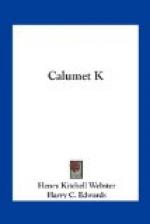Max’s eyes were bright, and his face red with exercise and excitement. He came to the gate and stood wiping his feet and looking from one to the other for several moments before he felt the awkwardness that had come over him. His long rubber coat was thrown back, and little streams of water ran down his back and formed a pool on the floor behind him.
“You’d better come out,” he said. “It’s the prettiest thing I ever saw—a clean straight span from the main house to the tower.”
Bannon stood watching him quizzically; then he turned to Hilda. She, too, had been looking at Max, but she turned at the same moment, and their eyes met.
“Do you want to go?” he said.
She nodded eagerly. “I’d like to ever so much.”
Then Bannon thought of the rain, but she saw his thought as he glanced toward the window, and spoke quickly.
“I don’t mind—really. Max will let me take his coat.”
“Sure,” said Max, and he grinned. She slipped into it, and it enveloped her, hanging in folds and falling on the floor.
“I’ll have to hold it up,” she said. “Do we have much climbing?”
“No,” said Max, “it ain’t high. And the stairs are done, you know.”
Hilda lifted the coat a little way with both hands, and put out one small toe. Bannon looked at it, and shook his head. “You’ll get your feet wet,” he said.
She looked up and met Bannon’s eyes again, with an expression that puzzled Max.
“I don’t care. It’s almost time to go home, anyway.”
So they went out, and closed the door; and Max, who had been told to “stay behind and keep house,” looked after them, and then at the door, and an odd expression of slow understanding came into his face. It was not in what they had said, but there was plainly a new feeling between them. For the first time in his life, Max felt that another knew Hilda better than he did. The way Bannon had looked at her, and she at him; the mutual understanding that left everything unsaid; the something—Max did not know what it was, but he saw it and felt it, and it disturbed him. He sat on the table, and swung his feet, while one expression chased another over his face. When he finally got himself together, he went to the door, and opening it, looked out at the black, dim shape of the elevator that, stood big and square, only a little way before him, shutting out whatever he might else have seen of rushing sky or dim-lighted river, or of the railroads and the steamboats and the factories and rolling mills beyond. It was as if this elevator were his fate, looming before him and shutting out the forward view. In whatever thoughts he had had of the future, in whatever plans, and they were few, which he had revolved in his head, there had always been a place for Hilda. He did not see just what he was to do, just what he was to become, without her. He stood there for a long time, leaning against the door-jamb with his hands in his pockets, and the sharper gusts of rain whirled around the end of the little building and beat on him. And then—well, it was Charlie Bannon; and Max knew that he was glad it was no one else.




